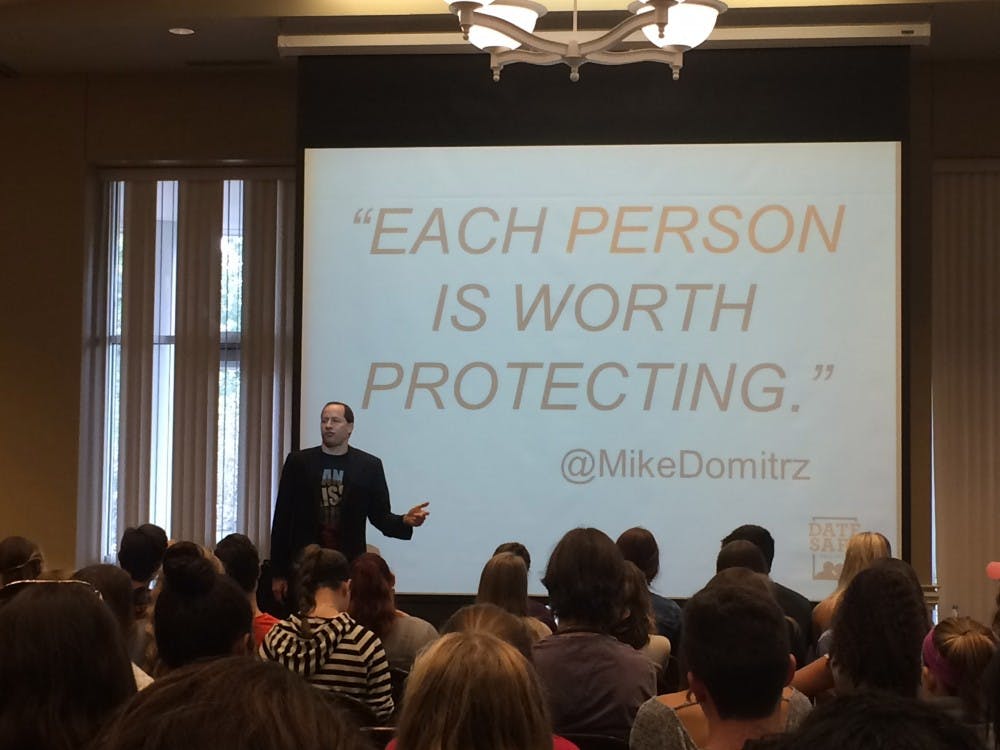McKinnon Hall was quieter than it had been the entire night. Author and speaker Mike Domitrz called out a handful of athletes during a serious and deeply personal moment in his “Can I Kiss You?” discussion.
“Athletes say, 'I hate that we have a reputation.' I say, 'Great, how do you live your life so that isn’t true?'” Domitrz said. “You’re talking and laughing while I’m talking about my sister being raped, and then you wonder why athletes don’t care about others. Imagine if someone in this room, a fellow athlete, said, ‘Hey, stop it, you are absolutely making us look like idiots.’”
Domitrz, a former college athlete himself, said during his discussion on consent, bystander intervention and supporting sexual at Elon University Sept. 25 that athletes are just one group that has the ability to spark change on campuses. He spoke twice, at 4:15 p.m. and 7:30 p.m., generating laughter and audience response during his two showings.
Throughout the talk, Domitrz addressed the power of asking before sexual contact, how friends may not be the best first place to go for sexual advice and misconceptions of the mix between alcohol and sex.
“People say alcohol is a social lubricant because they’re not actually comfortable having sex,” Domitrz said. “They use alcohol to trick themselves into believing they’re actually comfortable. If you’re comfortable, do you need one ounce of alcohol in you?”
Domitrz said using the term “liquid courage” to describe alcohol is inaccurate. Instead, he called it “liquid coward,” saying alcohol does nothing to lessen the fear of confrontation in sexual encounters.
“If you call it liquid courage, that makes people want to drink way more,” he said. “It’s more likely because it sounds more positive. The same goes when you say alcohol lowers inhibition, when it really just lowers standards.”
The only reason people fail to confront something is when they believe it isn’t worth it, according to Domitrz. He said human beings have no fear of confrontation, if impossible-to-win arguments with parents and people stopping their friends from driving home drunk are any indication.
Domitrz said people aren’t afraid of confrontation, rejection or being caught in an awkward moment when it comes to hooking up. Simply put, no one knows how to ask a simple question: "Can I kiss you?"
“The real reason we don’t ask this is that we were never taught how,” he said. “Most people are taught about abstinence or how to have safer sex. They’re important conversations — what not to do, and what not to get. The problem is if you’re being taught what not to do and what not to get, you’re never being taught what to do.”
This leads to people turning to less-than-useful resources, according to Domitrz: friends.
“Friends think their personal experience is knowledge,” he said. “So they tell you what to do, you try it, and then you learn you got some kinky weird friends.”
Domitrz argued that verbal communication with a sexual partner is vital, as body language is difficult to decipher.
“If you’re walking out of here saying, "That’s ridiculous," think of what you’re actually saying: Letting my partner choose is ridiculous,” he said. “What are you afraid of? The answer? That’s the only thing they can be afraid of.”
Some in the audience weren't seeing seeing Domitrz at Elon for the first time. Sophomore Ian Pomeroy said he joined SPARKS Peer Educators, a student organization that focuses on health-related programming, after going to Domitrz's program as a freshman.
“Last year, I came to the program, and it was one of the first times I ever heard the question [“Can I Kiss You?”] being raised,” Pomeroy said. “It was really interesting to me, so I came back. The way he talks to college students really connects with us.”
Senior Elyse Bierut said her third time seeing Domitrz was just as memorable.
“The first time I came with my cross country team, and we keep coming back because we think he’s great,” Bierut said. “It’s a challenging topic, but he does a good job.”
After the program, Domitrz said awareness of these types of social issues on college campuses has grown, especially when it comes to giving consent while drunk.
“It’s changed a lot since I’ve been doing this,” he said. “It used to be that people incorrectly said, 'Yes' when I asked if an intoxicated partner can give consent. Now people realize that they aren’t of sound mind. That’s a good thing, but there’s still a lot people need to learn.”


